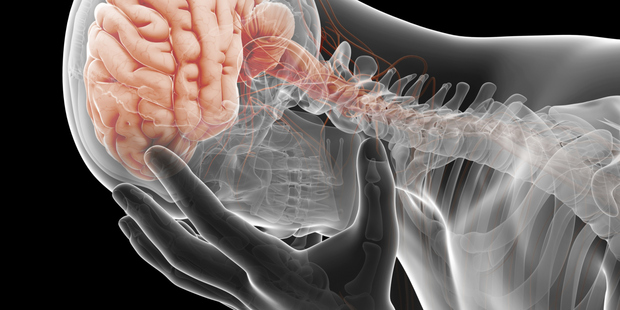 |
| Pain (dukkha, dukkhata), miserable pain! It's not all in my head! "Has an 'off switch' for pain been discovered?" (Thinkstock/nzherald.co.nz) |
 |
| Painful PAIN facts! |
Scientists say they have found a new way to "switch off" pain, and it could lead to the development of non-addictive drugs for millions of patients suffering chronic discomfort.
Researchers managed to block a pain pathway in rodents with chronic neuropathic pain, which develops due to nerve damage.
They did this by switching on a receptor, known as A3, in a rat's brain and spinal cord to counteract intense feelings of discomfort.
 |
| Dope-drugs aren't' the answer either! |
Current treatments for pain are problematic because they cause intolerable side effects, diminish quality of life and do not sufficiently quell pain, the scientists say.
But their new method could avoid nasty side effects from current pain relief drugs, such as addiction or increasing tolerance, meaning that people need to take higher and stronger doses of medication.
Scientists at Saint Louis University in Missouri, discovered that activating the A3 receptor in rodents -- using a native chemical stimulator called adenosine, or synthetic drugs -- prevents or reverses pain caused by nerve damage without side effects.
Their study is published in the medical journal, Brain.
 |
| Enter an unbelievable Cure! |
Daniela Salvemini, professor of pharmacological and physiological sciences at the university, demonstrated the ability of the A3 adenosine receptor to mediate pain relieving effects of the chemical adenosine.
"It has long been appreciated that harnessing the potent pain-killing effects of adenosine could provide a breakthrough step towards an effective treatment for chronic pain," she said.
 |
| Not sex nor food! |
"Our findings suggest that this goal may be achieved by focusing future work on the A3AR pathway, in particular, as its activation provides robust pain reduction across several types of pain."
The chemical is already being investigated by experts as anti-inflammatory and anticancer agent. More - Daily Mail
What is "pain" in Buddhism?
Ven. Nyanatiloka (palikanon.com); Dhr. Seven (ed.), Wisdom Quarterly |
| The Fat Happy Bodhisattva Ven. Budai or Hotei is not the Buddha, but he is happy. |
.
There are two kinds of "pain" Sanskrit and Pali dukkha) in Buddhism, one being physical and the other psychological. They are very similar, only the psychological is much worse and much longer lasting.
There is distress and disappointment arising from "painful feeling" or unpleasant sensation (vedanā), which may be bodily and mental.
There is also "suffering," "we," "ill." As the first of the Four Noble Truths (sacca)
and the second of the Three Characteristics of Existence (ti-lakkhana), the term dukkha is not limited to painful physical experience), but refers to the unsatisfactory and disappointing nature and the general insecurity
of all conditioned phenomena
 |
| Pain in the neck or lower? |
All things in general -- but particularly the Five Aggregates of Clinging -- are marred by suffering, that is, by being off kilter, unreliable, liable to fall away, empty/impersonal, offering no lasting comfort, no actual satisfaction.
On account of the universal characteristic of change or impermanence, all phenomena are
liable to suffering. Paradoxically, this also includes pleasurable experiences and sensations, particularly when we cling to them and yearn for them not to be impermanent.
Hence "unsatisfactoriness," "disappointment," or "liability to suffering" would be more adequate translations of the technical and multi-valent term dukkha. Often misunderstood, the first noble truth does not deny
the existence of pleasurable sensations and happy experiences, as is sometimes wrongly assumed. This
is illustrated by the following texts:
[The Buddha:] "Seeking satisfaction in the world, meditators, I had pursued my way. Satisfaction in the world I found. Insofar as satisfaction exists in the
world, I have well perceived it by wisdom.
"Seeking for misery in the world,
meditators, I had pursued my way. Misery in the world I found. Insofar as
misery exists in the world, I have well perceived it by wisdom.
 |
| Cool! Pleasure, pain, escape (Gustavo Turner) |
"Seeking for the
escape from the world [with all its suffering], meditators, I had pursued my way. Escape from the world I
found. Insofar as an escape from the world exists, I have well perceived it
by wisdom" (A.iii.105).
"If there were no satisfaction to be found in the world, living beings would not be
attached to the world....If there were no misery to be found in the world, living
beings would not be repelled by the world....If there were no escape from the
world, living beings could not escape therefrom" (A.iii.106).
But understanding suffering, its origin and cessation is an ennobling endeavor. That is, it leads to enlightenment, the state of the "noble" ones (aryas), whereas avoiding it only leads to more of the same.




















































































































































































































































No comments:
Post a Comment